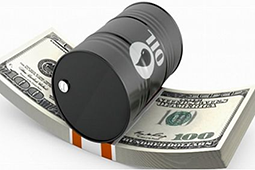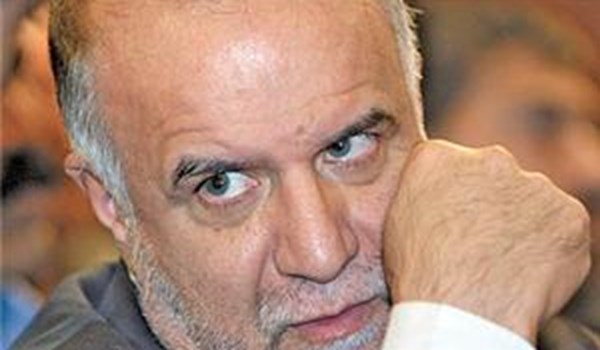
Iran: US Oil Waivers Not Enough, Crude Prices to Continue Rising


"US sanctions reprieves for some countries importing Iranian oil are not enough and oil consumers will have painful months ahead because of insufficient supplies," Zangeneh said.
He underlined that despite the initial rodomontade of Trump and a number of regional oil producers, the US government ultimately confessed to the severe shortage of oil and the impossibility of eliminating Iran from the market.
"The United States, he said, allowed Iranian imports because of a serious shortage of oil and a lack of balance between supply and demand which was pressuring large consumers," Zangeneh added.
The Iranian oil minister reiterated that this amount of exemptions does not correspond to demand, and said, "Hence, I have to say that unfortunately, painful months are predicted for oil consumers in the months ahead."
Zangeneh, meantime, said the Trump administration has artificially brought down oil and gasoline prices ahead of midterm elections by coordinating an increased draw in US crude inventory, but the prices will naturally move up in the coming months.
The US on Monday gave exemptions to eight importers of Iranian crude oil as it re-imposed sanctions on Iran’s banking, energy and shipping industries, backing down on its threat to zero the country’s oil exports.
In relevant remarks on Monday, Iranian President Hassan Rouhani underlined failure of Washington's policy to zero down the country's crude exports, stressing that Tehran would find a way to sell its oil under any conditions.
"The Americans, themselves, have admitted that they have failed in preventing our oil sales in the market; even if they did not declare failure and did not exempt a number of countries, we would sell our oil and sell it under any conditions," President Rouhani said in a meeting with high-ranking economic managers in Tehran.
He warned that the US aims to weaken Iran and disappoint the Iranian nation, and voiced confidence in Washington's failure.
"Iran will continue its powerfulness and the Iranian nation will continue its path with hope," President Rouhani said.
He, meantime, said despite short-term goals, the US sanctions will harm Washington in the long run.
"Today, we are in a position that international organizations and the world public opinion support us," Rouhani said.
The US Treasury Department announced all sanctions on Iran lifted under the 2015 nuclear deal would be back in force on November 5.
But the Trump administration declared on Friday that it will allow eight countries to import limited amounts of Iranian oil even after US sanctions take effect on Monday in a clear move to damp fears about a shortage of supplies.
According to Treasury Secretary Steven Mnuchin, the sweeping sanctions will see 700 people blacklisted, including people who were granted relief under the 2015 deal, as well as over 300 new names.
The Iranian officials have downplayed the effects of new sanctions on the country and its oil exports.
A first round of American sanctions took effect in August, targeting Iran's access to the US dollar, metals trading, coal, industrial software, and auto sector.
Speaking to reporters on Friday, Mnuchin said the sanctions will also target payments made through the EU’s SPV channel.
He also warned global financial messaging service SWIFT that it could be punished if it doesn’t cut off financial services to entities and individuals doing business with Iran.
"SWIFT is no different than any other entity… We have advised SWIFT that it must disconnect any Iranian financial institutions that we designate as soon as technologically feasible to avoid sanctions exposure,” he noted.
His remarks dismissed an earlier report by The Washington Free Beacon, which claimed senior State Department officials have convinced Secretary of State Mike Pompeo to allow Iran to remain connected to SWIFT.
The Trump administration earlier agreed to allow eight countries to continue purchasing Iran’s crude oil after Washington’s sanctions on Tehran take place next Monday.
A senior administration official told Bloomberg that waivers were aimed at preventing oil price hikes and would be granted in exchange for continued import cuts.
The November 5 sanctions were the second batch of bans re-imposed after Trump pulled the US out of the 2015 deal, which was signed by Iran and six world powers in 2015.
The new sanctions cover Iran’s shipping, finance and energy sectors, and penalize other countries that don’t stop dealing with Tehran.
US President Donald Trump announced on May 8 that Washington would no longer remain part of the Joint Comprehensive Plan of Action (JCPOA) and promised to re-impose the highest level of economic sanctions against Iran.
The sanctions reinstated on Iran on May 8 included boycott of Iran's crude supplies and bans on transfer of its crude revenues. There is a 180 days interval before these sanctions come into effect. Other US secondary sanctions are reinstated this month.
After Trump's declaration, the Iranian government issued a statement, calling the US withdrawal as "unlawful". The statement underlined Iran's prerequisites for continuing the deal with the five world powers. These conditions that were reiterated later by Iran's Supreme Leader Ayatollah Seyed Ali Khamenei later mainly included Iran's guaranteed crude sales and transfer of its revenues back home.
Two months later, the other five powers party to the nuclear deal have failed to satisfy Iran. President Hassan Rouhani voiced his disappointment over a recent package of incentives proposed by the European Union countries to Tehran, and said that the Islamic Republic expected a much better, clearer and explicit stance by the EU.
"Unfortunately, the EU’s package of proposals lacked an operational solution and a specific method for cooperation, and featured just a set of general commitments like the previous statements by the European Union," President Rouhani said in a telephone conversation with German Chancellor Angela Merkel on July 5.
President Rouhani pointed to US' unilateral withdrawal from the nuclear deal, and said, "After the US withdrawal from the JCPOA, Iran has been dealing with economic issues and problems in banking relations and oil, and foreign companies that have invested in Iran are skeptical about continuing their business."
The Iranian president, however, said that the package proposed by the three European countries (the UK, Germany, and France) on how they are going to live up to their commitments and cooperation under the JCPOA was “disappointing”.
President Rouhani reiterated that the JCPOA was a mutual commitment, and said, "Iran had expected a clear plan from the three European countries after the two months’ time they have been given to come up with solid guarantees to ensure Iran’s economic interests would continue to be met despite US pullout and reinstatement of sanctions."
The Iranian president, however, said that Tehran would continue cooperation with Europe if the outcome of the July 6 Vienna talks would be promising.
“If the process of the European foreign ministers’ meeting in Vienna, which is aimed at encouraging Iran to cooperate, is promising, we will continue our cooperation with Europe,” Rouhani added.
But the Vienna talks July 6 among foreign ministers from Iran and the five world powers (Russia, China, Germany, France and Britain) failed to satisfy Iran with senior officials in Tehran complaining that the Europeans had offered nothing new to ensure Iran’s continued merits under the deal.
On July 8, the Iranian parliament's research center has readied a comprehensive plan that includes a detailed list of policies and moves to fight off sanctions as Washington sped up attempts to rally international support for intensified pressures on Tehran.
The comprehensive "active anti-sanctions plan" that has been compiled at the parliament research center after long studies and consultations with experts from Iranian research and academic centers, traders and entrepreneurs is now under study by senior Judiciary, Parliament and Government officials for a final editing.
The program that mainly aims to make the country "unsanctionable" has been developed in contrast to the US sanctions program and has reportedly been edited seven times so far, several MPs told FNA.
Information obtained by FNA reveals the program offers a package that also involves social and cultural measures to reinvigorate the country's economy and infrastructure against the US sanctions that come into effect from 90 to 180 days after their re-imposition and seek to wear off Iran's economy step-by-step.
The plan also entails specific time-based nuclear, security and political leverages that would be enforced in reprisal for enemy threats, while it also envisages transient waivers that could be extended, halted or annulled based on relevant decisions by authorities.
The plan to make Iran sanction-proof includes detailed measures in two 90-120 days and 180-210 days periods in various areas of monetary, banking and currency sector, liquidity management and deterring middlemen disruption and negative interference, optimized forex reserves management, facilitated money transfer in the international market, reduction of intermediary currency role, strategic commodities, budget resources and use, energy, business, trade, structures, culture, society, media and legal affairs.
Meantime, several other plans have also been compiled by university and research centers for improving economy through reinvigoration of national potentials to make the country sanctions-proof.


Trump weighs using $2 billion in CHIPS Act funding for critical minerals

Codelco cuts 2025 copper forecast after El Teniente mine collapse

Electra converts debt, launches $30M raise to jumpstart stalled cobalt refinery

Barrick’s Reko Diq in line for $410M ADB backing

Abcourt readies Sleeping Giant mill to pour first gold since 2014

Nevada army depot to serve as base for first US strategic minerals stockpile

SQM boosts lithium supply plans as prices flick higher

Viridis unveils 200Mt initial reserve for Brazil rare earth project

Tailings could meet much of US critical mineral demand – study

Kyrgyzstan kicks off underground gold mining at Kumtor

Kyrgyzstan kicks off underground gold mining at Kumtor

KoBold Metals granted lithium exploration rights in Congo

Freeport Indonesia to wrap up Gresik plant repairs by early September

Energy Fuels soars on Vulcan Elements partnership

Northern Dynasty sticks to proposal in battle to lift Pebble mine veto

Giustra-backed mining firm teams up with informal miners in Colombia

Critical Metals signs agreement to supply rare earth to US government-funded facility

China extends rare earth controls to imported material

Galan Lithium proceeds with $13M financing for Argentina project

Kyrgyzstan kicks off underground gold mining at Kumtor

Freeport Indonesia to wrap up Gresik plant repairs by early September

Energy Fuels soars on Vulcan Elements partnership

Northern Dynasty sticks to proposal in battle to lift Pebble mine veto

Giustra-backed mining firm teams up with informal miners in Colombia

Critical Metals signs agreement to supply rare earth to US government-funded facility

China extends rare earth controls to imported material

Galan Lithium proceeds with $13M financing for Argentina project

Silver price touches $39 as market weighs rate cut outlook

















